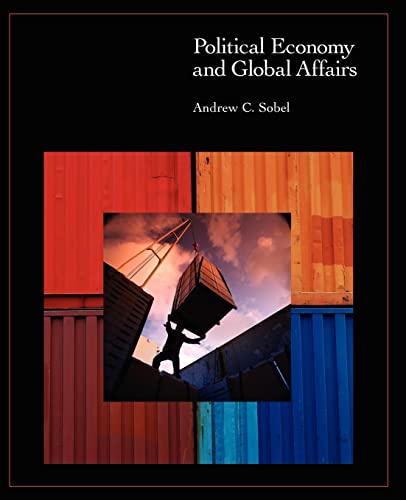Political Economy and Global Affairs
Andrew C. Sobel specializes in the politics of global finance with a focus on domestic explanations of international behavior. He earned his Ph.D. in political science from the University of Michigan. He is on the faculty of International and Area Studies at Washington University in St. Louis, a member of the Academic Board of Directors of the Center for New Institutional Social Sciences, and on the Faculty Advisory Council to the Center for the Interdisciplinary Study of Work and Social Capital at Washington University. He has won numerous teaching awards. He has published many articles and is the author or editor of six books, including Domestic Choices, International Markets (1994); State Institutions, Private Incentives, Global Capital (1999, 2002); Political Economy and Global Affairs (2006); The Challenges of Globalization (2009); and Birth of Hegemony: Crisis, Financial Revolution, and Emerging Global Networks (2012). ... Read more Read less
Policy decisions at the domestic level—whether relating to currency rates, tariffs on certain goods, or labor protection—factor heavily on such issues as trade, monetary policy, foreign debt, and development. How can we best understand the way those decisions and events at the national level affect outcomes and policy at the international level? A focus on one over the other paints an incomplete picture for students. Sobel contends that we must focus on the individual preferences, strategies, and choices of political-economic policymakers in order to fully understand the larger, macro view of international political economy. With the aim of linking the two, Sobel helps students develop analytic skills for describing both what happens in the international political economy, and why policymakers make the choices they do. In this groundbreaking new text, Sobel presents—in a lucid and intuitive way—the core assumptions of scarcity, political survival, and rationality which form the basis of the book's "micro-level" approach. Individuals—not nations—make choices. With constraints as to what resources and opportunities are available, policymakers choose among alternatives that are most in sync with their self-interest. If students understand market failure and social traps, as well as how collective action problems affect interest group and institutional performance, they will be able to answer questions about a wide spectrum of events that start at the domestic level and spill over into global economic markets. To add context, Sobel presents a concise but detailed historical overview of globalization that demonstrates the shortcomings of common macro-level models in the field, from realism to liberalism to hegemonic stability theory. Your students will be equipped with a set of analytic tools that better explain individual behavior and social outcomes in areas such as trade liberalization, institutional bargains, factor endowments, currency exchange systems and convertibility, and development. Special features: Exercises at the end of each chapter encourage students to apply the concepts they've just read about. A suggested reading list for each chapter provides rich sources for further study. Valuable figures and tables as well as highlighted key terms and a glossary help students grasp important concepts and aid in study. Photos enliven the book's presentation and provide visual examples to help students understand core concepts. ... Read more Read less











